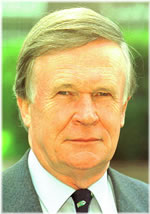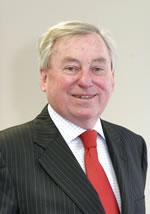20.11.2008
Dr Garret FitzGerald was elected Chancellor of the National University of Ireland in October 1997, and has now decided to step down from this position. As provided by the University Statutes, the members of NUI Convocation will elect a new Chancellor at a meeting to be held on Thursday 12th March 2009.
Two candidates have been duly nominated for this election
 HEFFRON, Prof James J A, DSc, PhD, MRIA, FRSC, FICI, CChem, EurChem,
HEFFRON, Prof James J A, DSc, PhD, MRIA, FRSC, FICI, CChem, EurChem,
CSci

James J A Heffron, DSc, PhD, MRIA, FRSC, FICI, CChem, EurChem, CSci
Professor James Heffron has enjoyed a distinguished lecturing and research career at University College Cork. His interest in the university and its continuing fundamental role in society, even pivotal in the current economic crisis, is evidenced in the book Beyond the Ivory Tower – The University in the New Millennium(2000), which he co-edited when Chairman of NUI Convocation, marking a time of rapid expansion and change in our universities.
His research on the human genetic disorder Malignant Hyperthermia led to discovery of the MH gene and to advances in biochemical toxicology of anaesthetics and pollutants. He had a significant influence in shaping UCC’s world-class Department of Biochemistry. At Faculty and College level he served as Dean of the Faculty of Science and member of Governing Body and has long established research links with the pharmaceutical industry.
He was adviser and contributor to the World Health Organisation’s Air Quality Guidelines for Europe(2000), is a founding member of the European Malignant Hyperthermia Association, Member of the Royal Irish Academy, Fellow of the Royal Society of Chemistry, member of the American Chemical Society and Chartered Scientist(UK).
He graduated with a First Class BSc in Biochemistry at University College Dublin (1964) and PhD(1969). He held academic positions at Mayo Clinic and Graduate School of Medicine, USA and was Royal Society-Royal Irish Academy Research Fellow at University College London. He publishes widely in Nature, Proceedings of the National Academy of Sciences of USA, British Medical Journal etc; was awarded DSc by NUI and Royal Irish Academy Silver Medal for distinguished biochemical research.
Thug an tOllamh James Heffron tréimhse oirirc i mbun teagaisc is taighde i UCC. Is é a thaighde ar an neamhord géiniteach daonna an Hipirteirme Urchóideach is cúis leis go dtángthas ar ghéin na HE agus faoi deara an dul chun cinn i dtoicsíneolaíocht bhithcheimiceach na n-ainéistéiseach is na n-earraí truaillithe timpeallachta. Bhí baint mhór aige le Roinn Bhithcheimice UCC, a bhfuil cáil domhanda uirthi, a mhúnlú. Ag leibhéal na Dáimhe is an Choláiste, d’fheidhmigh mar Dhéan ar Dháimh na hEolaíochta agus mar bhall den gCoiste Rialaithe, is tá ceangail fhada bhuana taighde aige le tionscal na cógaisíochta.
Bhí ina chomhairleoir is ina scríbhneoir ag Treoirlínte don Eoraip um Cháilíocht an Aeir (2000) de chuid an Eagrais Sláinte Domhanda, ba bhall é den bhuíon a thionscain an Grúpa Taighde Eorpach ar an Hipirteirme Urchóideach, tá ina iarChathaoirleach na Comhghairme in Ollscoil na hÉireann, ina bhall d’Acadamh Ríoga na hÉireann, ina Chomhalta de Chumann Ríoga na Ceimice agus ina bhall de Chumann Ceimice Mheiriceá.
Bhain céim BSc le Céad Onóracha amach sa Bhithcheimic i UCD(1964) maraon le PhD(1969). Bhí ceapacháin acadúla aige i gClinic agus i Scoil Iarchéime Leighis Mayo, SAM, agus é ina Chomhalta Taighde de chuid an Chumainn Ríoga-Acadamh Ríoga na hÉireann i gColáiste na hOllscoile, Londain. Tá mórán i gcló aige in Nature, Proceedings of the National Academy of Sciences of USA, British Medical Journal etc., bhronn OÉ an DSc air is fuair Bonn Airgid Acadamh Ríoga na hÉireann ar son taighde ar ardchaighdeán sa bhithcheimic.
Is fianaise é a leabhar Beyond the Ivory Tower – The University in the New Millennium (2000) ar a raibh sé ina chomh-eagarthóir, ar a spéis san ollscolaíocht agus san ról fhíorthábhachtach atá aici sa sochaí, tráth a bhfuil forbairt mhear agus athruithe ag teacht ar á gcuid ollscoileanna.
 MANNING, Dr Maurice A, BA, MA, DLitt
MANNING, Dr Maurice A, BA, MA, DLitt

Maurice Manning, BA, MA, DLitt
Maurice Manning is the President of the Irish Human Rights Commission and is Chair of the European Group of National Human Rights Institutions.
Dr Manning was born in Bagenalstown, Co Carlow, educated at de la Salle Schools Bagenalstown, Rockwell College, University College Dublin and the University of Strathclyde.
Dr Manning is currently a member of the Senate of the NUI, having been elected on the graduate panel in every election since 1982. He served on the Governing Authority of UCD from 1979 to 2008. He spent much of his academic career in the Department of Politics at UCD where he established a reputation for his teaching, his closeness to students and his publications. His publications include five books on modern Irish politics, a political thriller, Betrayal, and numerous articles and academic papers. He is currently Adjunct Professor in the School of Politics and International Relations at UCD.
Dr Manning has served in both Dail and Seanad Eireann. During that time he was a member of the New Ireland Forum, and the British-Irish Inter-Parliamentary Body. He was both leader of Seanad Eireann and Leader of the Opposition in that House.
He is currently chair of the Publishing Committee of the Institute of Public Administration.
The contribution of the NUI to modern Ireland is both significant and substantial. In a real sense it was a key element in the creation of the modern Irish State, its graduates taking a leading role in politics, administration, business, the professions, education, arts and culture. All of its Chancellors from Archbishop William Walsh, through Eamonn de Valera, T. K. Whittaker and Garret Fitzgerald have brought distinction and stature to the office.
The Universities Act of 1997 means a changed role for the NUI. The process of change has already begun, redefining the relationship between the NUI and the constituent Universities and Colleges and reshaping the distinctive contribution of the NUI to Irish higher education. It will be the core task of the next Chancellor to lead this process in a way which respects the traditional values and mission of the NUI while ensuring that changes which ensue ensure the NUI remains relevant and positive in face of the challenges of a rapidly changing educational sector and society.
Tá Ollscoil na hÉireann ag fónamh do shaol na hÉireann agus don oideachas in Éirinn le céad bliain. Braistint láidir shainiúil den fhéiniúlacht chultúrtha Éireannach an phríomhthréith a bhaineann leis an gcion atá déanta ag Ollscoil na hÉireann i gcaitheamh na mblianta, faoi go seasann sí ar ardchaighdeáin acadúla agus go bhfuil feasacht aici ar ról na hÉireann sa phobal acadúil trí cheile. Chothaigh sí an choláisteacht i measc ár n-ollscoileanna, chuir sí fóram ar fáil don agallamh idirollscoile agus bhí sí i dtús cadhnaíochta i múnlú na tuairimíochta faoi chuid mhór saincheisteanna oideachais.
Le hachtú Acht na nOllscoileanna 1997 is é cor na hOllscoile Náisiúnta anois, nach ann níos mó do chuid mhaith dá feidhmeanna traidisiúnta agus go bhféadfadh an chinniúint chéanna a bheith i ndán don Ollscoil féin. Is é a bheidh le déanamh ag an gcéad Sainsailéir eile an Ollscoil a stiúradh d’fhonn na dúshláin sin a thabhairt agus ról nua a leagan amach di a bheidh bunaithe ar chroíluachanna na hOllscoile ach a mbeidh aird aige freisin ar na tosca úra.
Members of Convocation (Chancellor, Vice-Chancellor, Members of Senate, Professors and Lecturers, Graduates - including Honorary Graduates - of the University) who wish to vote in the election of the NUI Chancellor, must apply in writing. To facilitate this, a customised form may be downloaded. Latest date for receipt of applications to vote: Wednesday 4th March 2009.
![]() Election of Chancellor Voting Paper Application Form (Irish)
Election of Chancellor Voting Paper Application Form (Irish)
![]() Election of Chancellor Voting Paper Application Form (English)
Election of Chancellor Voting Paper Application Form (English)
Alternatively email elections@nui.ie, giving, along with your request for voting papers, the following information:
- Full name (forename and surname) at registration
- Any other form of name used (e.g. Irish, single, married etc)
- Date of birth
- NUI degrees and other NUI qualifications (with respective years of conferring and NUI institutions where conferred)
- Previous address (for identification purposes)
- Current address






















